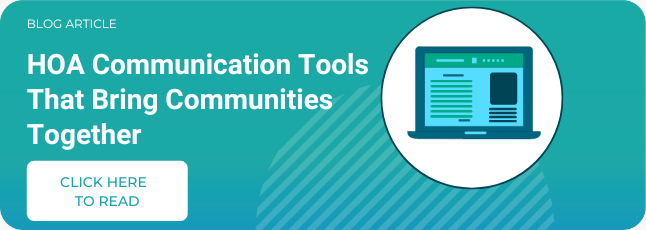An HOA social media policy is essential for board members to manage all communication channels in their communities properly.
But what exactly is a social media policy? What are the risks if you don’t implement one? What rules should be addressed in such policy?
Learn all about it in this post.
What is an HOA social media policy?
An HOA social media policy is a set of rules that must be followed by homeowners to ensure proper conduct on an association’s online page. It is not mandatory for HOAs to set and enforce a policy. But, it is highly recommended to avoid any abuse or lawsuits. Such policy should always comply with state/federal law and the governing documents of the homeowner association.
What are the risks of not implementing an HOA social media policy?
Unfortunately, there are many risks associated with social media platforms. In recent years, lawsuits have become more common because of inappropriate behavior in such sites. While these networks improve how homeowners engage and connect, they also bring in issues. Here are some of the main risks:
- Defamatory or offensive remarks
- Harassment
- Leaking of personal or confidential information
“unregulated social media communications in managed communities can cause inflamed neighborhood tensions, unforeseen insurance liabilities, and even lawsuits.”
Jack Hanson
Which essential points should your policy address?
1. Choice of platform
When deciding to have an online presence, it can be hard to know which type of social media will best serve your HOA. But, by considering your audience and objectives, it can be easy to find out. The most common network that community associations use is Facebook. It comes as no surprise since it is the most used social media worldwide. Besides, HOAs like it because it allows users to create private groups. However, other sites exist, such as:
- Nextdoor
- Telegraph
Some HOA software also provide an integrated social media feature. It has the same functionalities as a public social network, but it is strictly made for your community. This is actually the best way to ensure that only residents are accessing the platform. In fact, it can be tricky when using public channels such as Facebook.
You, indeed, have less control over who sees your content. Also, since it is a public platform, sensitive information can easily be leaked to the general public. For an ideal situation, we recommend that HOAs choose the most secure platform and stick to it. Here is why:
- Having all social media communication centralized in one place
- Greater control over activities on your HOA online page
- Reducing the Board of directors’ workload
When selecting a platform for your HOA’s online presence, prioritizing security, privacy, and community-focused features is critical. Neigbrs by Vinteum Socials emerges as an ideal secure HOA communication platform, offering a private social network exclusively for residents that mitigate risks like data leaks or harassment common on public forums.
Unlike generic social media such as Facebook or Nextdoor, Neigbrs combines community management software with encrypted communication tools, ensuring only verified members access sensitive updates, event calendars, or safety alerts.

2. Responsibilities
After choosing the platform that you will use, it is necessary to designate administrators. An administrator is someone in charge of running, managing, and maintaining a page.
Here, it is also important to define who will be in charge to post on behalf of the association. It is crucial to restrict this capability to a few board members only.
Otherwise, things will go out of control. Besides, you can create a good conduct chart that members involved with social media can sign.
3. Allowed and prohibited content
Some platforms allow administrators to approve or disapprove of anything user posts. Even comments. Therefore, your policy should clearly state what content you allow or prohibit users to publish.
This will help administrators regulate the information. Remember, an HOA social media page should exist to foster engagement and improve communication.
It should not be a place where residents complain about other residents. Nor a place where homeowners criticize board members. If you don’t regulate a social network properly it can rapidly affect your community’s well-being.
Here are some examples of content to prohibit on your social media pages:
- Any type of discrimination against any individual
- Offensive or defamatory posts or comments
- Insults, harassment, and stalking
- Posts promoting illegal activities
- Sharing private, confidential, personal, or sensitive information about oneself or others
- Spam
- Products or services advertising
- Sharing images or videos that have copyrights or without permission/consent
This list is not exhaustive and of course, you should adapt it to your own HOA’s needs. However, the last point is important to explain further as it is a common mistake individuals make.
Let’s consider that a board member would like to promote an HOA event. To do that, he looks for a barbecue image on Google and posts it on the Facebook group.
Well, this image he found on Google probably has copyrights. This means you can’t use it for your matters. The right way to proceed is to find an image on a free copyright database such as rawpixel or unsplash.
Here is another scenario, imagine the event has passed and you’d like to post pictures of it.
You publish several pictures where children appear. Their parents did not give you their consent to post them.
This can create a conflict. So make sure that when you post any community event picture you have consent. If someone complains after you posted an image then make sure to be proactive and remove it.
It is also important to mention what type of information will be posted on this social media.
This way, homeowners know exactly what to expect there.
Keep in mind that a social media post/comment cannot replace a written notice. This communication channel is mainly used for less formal communication.
Here are some examples of permitted publications:
- Promoting your HOA newsletter or HOA website
- Promoting HOA events or activities around the neighborhood
- Sharing information about community amenities
- Running HOA surveys or polls
- Informing about lost pets
- Sharing day-to-day tips or DIY (eg. sustainability or maintenance tips)
4. Code of conduct
It is important to state clearly how you expect users to behave on your page. Some platforms have a special setting for that.
For example, when joining a Facebook group, members can be required to agree to certain rules to be accepted.
It is a good way to entitle users to be respectful and have empathy. Most importantly, it is a good reminder that the internet is forever. Even if a post gets deleted, the consequences of your words will remain.

Key takeaways
Social networks have entirely changed the way we all communicate. Learning how to master these emerging communication means is challenging. Here is why having a policy is necessary for any HOA.
It will help you mitigate the risks of conflicts and lawsuits. An HOA social media policy is the best tool to avoid any harm or pitfalls.
By implementing one, your community will enjoy all the benefits social media has to offer.
Click below to learn about different HOA communication tools.




